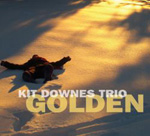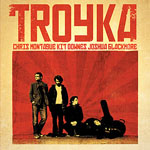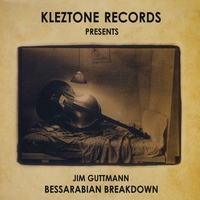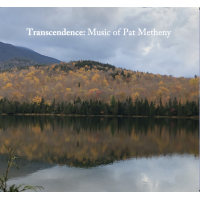Home » Jazz Articles » Interview » Kit Downes: You Have to Be What You Are
Kit Downes: You Have to Be What You Are

If there was a way to hear everything that's going on--if, for a week, you could replace 'MTV' with 'JazzTV'--suddenly, everyone would find at least one thing they liked.
While the intelligent but unassuming musician has seen his reputation extend across the jazz scene, in the weeks leading up to this interview he was also coming to terms with the attention of the wider British media, as the Kit Downes Trio's debut—Golden (Basho Records, 2009)—was nominated for the 2010 Mercury Music Prize. The prize is one of Britain's top music awards, selecting a winning album from a shortlist of 12 nominated recordings, all by British or Irish acts but culled from any genre of music.
Although the Trio didn't win—the 2010 Mercury Music Prize went to The XX—the nomination has impacted hugely on Downes, as he acknowledges. "It's allowed us to do a lot more things outside the jazz world—its allowed us to do more things within jazz, too, but doing radio to bigger audiences, things like that, has been lovely. It's especially nice for us because Golden is quite a traditional jazz record: the lineup is piano, drums, bass, all acoustic, all first takes, no editing."
Downes is keen to contrast this approach with the Trio's newly-recorded second album: "It's funny, because our next album is much more of a studio thing—there are other musicians joining us. But Golden sums up where we were at that time: it's a very jazzy record, lots of improvisation blended in with lots of written passages as well. So it's been nice to take very jazzy music on to very non-jazzy radio stations and to talk to non-jazz DJs. Once you start talking to these people about the music they become interested in the processes, in how we do things."
Downes has used the opportunities afforded to him by this new media access to expand on his own work and that of the Trio: an interview for The Guardian newspaper's website is a case in point, as he explains. "A lot of people who did this just spoke about the words of a song then played it. That was interesting in itself, but we took the chance to talk about how you bridge the gap between written material and improvising—how the two meet and how you try and disguise the two, how we play together, things about ensemble playing—specific musical things we're interested in. The guy doing the interview started becoming really interested in this—explaining the process is quite important for this music, because I think it's quite difficult to listen to this music without knowing a bit about where it's coming from. Once you start explaining that process people become a lot more fascinated with it and have a lot more open minds to listen to it, I think. So that's been really lovely."
It's clear that Downes' experience with the non-jazz media has given the Trio some new insights into their music as well: "Us talking about it makes us more aware of it ourselves. It's like teaching; when you're having to explain something to someone you have to really work it out for yourself first." The nomination has also expanded Downes' own musical horizons by introducing him to acts he's not previously been aware of: "People throw names at us that we don't know—like the nu-folk scene that also has an influence on jazz in Europe. So listening to people like [fellow nominee] Laura Marling has been really nice. I wasn't aware of these people before."
 Downes' lack of familiarity with nu-folk and other genres stems from his conscious decision to avoid much contemporary media. It's an interesting position for a young person to hold but there is logic to it: "I don't watch television or listen to the radio, I just listen to music people tell me they like and so I might not have come across these names for a little while. I guess it's an unusual thing not to have a TV or a radio; it's not necessarily better or worse, but I made a decision—this sounds a bit dramatic—not to be told what to listen to, or at least to pick who I take advice from very carefully."
Downes' lack of familiarity with nu-folk and other genres stems from his conscious decision to avoid much contemporary media. It's an interesting position for a young person to hold but there is logic to it: "I don't watch television or listen to the radio, I just listen to music people tell me they like and so I might not have come across these names for a little while. I guess it's an unusual thing not to have a TV or a radio; it's not necessarily better or worse, but I made a decision—this sounds a bit dramatic—not to be told what to listen to, or at least to pick who I take advice from very carefully." Such an approach is refreshing, but perhaps it's coming to an end, thanks to Golden's nomination: "Suddenly my CD is in the Mercury Music Prize list, whose whole point is to expose things that wouldn't otherwise get that exposure. It's made me reevaluate what I think and that whole process, working out where music like mine fits in the music industry, has been fascinating. It's also amazing how the Prize does that, defying the larger industry and including a jazz album, folk albums, unheard albums in the nominations. I think it's really important that such a tradition of creativity in the UK is still referenced in this big award."
The Prize committee doesn't select from the entire output of British albums; instead, record companies have to submit albums for consideration by the judging panel. Presumably the Kit Downes Trio's label, Basho Records, discussed the submission process with Downes? Apparently not, as he explains: "No, not at all. A couple of months after the label had submitted Golden I was having dinner with Christine [Allen] from the label and she said 'Oh, I nearly forgot to enter you for the Mercury Prize. I nearly missed the deadline.' I didn't give it another thought, because I had the prize down as being for more crossover jazz. This was my own fault, my limited view, because I didn't know much about it. So I thought that I'd never have to think about it again, because the Trio always feels to me like a little underground thing and so I never thought I could get to something like the Mercury by making that sort of music."

Being unprepared for the nomination, Downes was at first somewhat phased by the experience: "At first I was totally shocked by all these pop critics going 'Who the Hell is Kit Downes? Why is he on the list when we could have had two more up and coming important pop acts.' That's fine, it's their prerogative and, of course, you've also got all these jazz journalists going 'Where are all the other jazz bands?' Because you can't represent the whole of the UK jazz scene with one album because it has such rich diversity."
The press conference that followed the announcement of the nominated albums was a new experience for Downes and fellow Trio members, drummer James Maddren and bassist Calum Gourlay: "It was very strange: especially with us being quite young and shabby and totally not hip in any way. We shuffled into the press conference with our scrabbly outfits and beards and hair, looking like total beatniks. After the initial shock and some criticism from pop journalists it made me think 'Well, that's what I am. I am a jazz act, I'm not trying to fit into your world, someone else has brought me into the pop world.' You have to be what you are, and be uncompromising about it. Once I got my head around that it got a lot better—it's hip to be the underground thing that no-one has heard of."
Although Downes seems very blasé about the press criticism, some of it was almost vitriolic. The most obvious example was from the British daily tabloid newspaper The Sun: under the heading "Prize Idiots" the paper's show business gossip writers claimed that Downes was "an idiot" because he had never heard of the Mercury Music Prize. Such a non-story seems barely worth the column inches, even if it were true, and it seems even more amazing that anyone could apparently feel the need to express anger about it. Downes' mature attitude meant that he didn't take the story to heart: "It was hilarious. I've got the press cutting on my fridge... The idea that I hadn't heard of the prize was actually a misquote from another newspaper story. But they are there to make stupid news: the column is called Bizarre."
 "The stuff that really annoys me comes from the people who can't be bothered to listen to the music. They'd rather just dismiss it straight away rather than doing their job, which is to listen to it then say what they think about it." Does Downes think that there is a lot of this type of press response around? "Every year it's the same. Every year the jazz act gets panned. So I wasn't surprised. It's just a shame. It doesn't seem like a very human thing to do. It's a strange thing to me—most good musicians like diverse music and it seems an odd thing to just shut something out and just resort to press stereotypes to get more people to read a funny headline. Like my mum says, it's tomorrow's fish and chip wrapper."
"The stuff that really annoys me comes from the people who can't be bothered to listen to the music. They'd rather just dismiss it straight away rather than doing their job, which is to listen to it then say what they think about it." Does Downes think that there is a lot of this type of press response around? "Every year it's the same. Every year the jazz act gets panned. So I wasn't surprised. It's just a shame. It doesn't seem like a very human thing to do. It's a strange thing to me—most good musicians like diverse music and it seems an odd thing to just shut something out and just resort to press stereotypes to get more people to read a funny headline. Like my mum says, it's tomorrow's fish and chip wrapper." Downes has a positive attitude to the press coverage the Trio have received from the Mercury Music Prize, feeling that on balance it does more good than harm. "What's nice is that lots of people get in touch to say they would never have bought the album but for the Mercury nomination, but they really like it. It's a pretty amazing thing that if someone buys only one jazz album in a year, it's your album. That's really amazing—it's a privilege to be in that position."
Golden is a beautiful album, worthy of its nomination. It is also, even in a list that contains more than one folk-inspired album, the record with the most direct link with the past. The Trio's line up and instrumentation has a contemporary take, but it's easy to see the link with Bud Powell or Al Haig.
Downes agrees that the Trio's links with the past might fit with the current music scene's interests, but there are other aspects of their approach that he sees as equally, if not more, important: "The other bands have also been going a lot longer than us. I think Golden is the only debut on the list [in fact, winning band The XX were also nominated for their debut recording]. I decided to record the album because we had played together for four years and it seemed important to document this. Basho Records approached us after we had finished the recording. We did it at a cheap studio, almost as a live recording. There's no edits: it was all done in one room with a couple of mics. It's really raw. We made our money back after selling a couple of hundred albums."
 Kit Downes Trio, from left: James Maddren, Kit Downes, Calum Gourlay
Kit Downes Trio, from left: James Maddren, Kit Downes, Calum Gourlay"The next album is slightly different. I'm writing for more instruments, to overdub. I guess there's a more obvious traceability to the past with our records than the others in the list maybe most of all because of the aesthetic, the fact that it is a live recording like those albums they made in the '50s or '60s, with one mic in a room."
The Trio's second album was recorded at Curtis Schwartz' studio, where many top British jazz acts seem to be heading these days. Downes has a clear reason for going there: "It's amazing. They have the most unbelievable piano—a mix of a really good piano with an individual identity."
Downes makes what he sees as an important point about the genesis of Golden and other albums: "We didn't make the album with the intention of it being listened to by hundreds of thousands of people: that's not why you should make music. You should make music to be listened to and accepted by yourselves. Who else listens to it is not your concern from that point on. And it is really weird listening to it because we sound two years younger. In jazz, things can change very quickly, especially in the early stages where we are. But there's something naive about it, which I like."
Golden starts and ends with two beautiful tunes with gorgeous melody lines: "Jump, Minzi, Jump" and "Tom's Tune." But in between the two, tunes like "Power and Patience (the Bear)" include some long and complex improvisations. For someone coming to the album from the Mercury list this might make them work a little bit. "I like to think a lot about track listings—it's a bit of a mini-obsession of mine. It's like playing a gig; you want to pace things and think of it as an overall piece of music. I like to think that there are people out there who still listen to an album in one go. But I would have done the track order differently if I was doing it now. I think I would have put "Homely" further down and put "Tom's Tune" further up. That's kind of the vibe of the Trio as well, putting some subversive, angular, free improv into the middle of something. Because we like that type of music but we also really like melody."
Downes, Gourlay and Maddren are, like most professional jazz musicians in the UK, members of many different bands. It's partly something driven out of economic necessity, but that's not the only reason why Downes and his band mates work in that way. "I was speaking to someone at Kerrang! Radio [a UK radio station specializing in rock and heavy metal music] and they couldn't believe it when they heard how many bands we were in—because pop and rock musicians are generally just in one or maybe two bands. But there are so many bands and so few gigs in the scene that in order to survive you have to be versatile. Also, it's a really searching music and you want to be in as many things as you can—it feeds you. At our age, it's a really important thing to play many different styles of music. I don't think Hank Jones got to where he was just by playing one style of music. It's the same with Elvin Jones, Bill Frisell, all the people I really love."
 Playing in so many bands can get confusing and complicated. "We're in other people's bands together as well. It's all strength to the UK scene: there are so many bands, so many people writing music, there's really something for everyone in the UK jazz scene."
Playing in so many bands can get confusing and complicated. "We're in other people's bands together as well. It's all strength to the UK scene: there are so many bands, so many people writing music, there's really something for everyone in the UK jazz scene." The diversity of the scene is something about which Downes is clearly excited. "If there was a way to hear everything that's going on—if, for a week, you could replace MTV with JazzTV—suddenly, everyone would find at least one thing they liked. You've got Acoustic Ladyland to Evan Parker to Portico Quartet to Polar Bear: and then you've got Paul Dunmall, Clark Tracey to Stan Tracey to Stan Sulzmann. And the whole think links together—almost every one of those people I just named will have played together at some time."
Downes is, in fact, a member of Sulzmann's band, Neon, which made its debut only a few days before the interview: "We had our debut at the Pizza Express and then we did the Brit Jazz festival at Ronnie Scott's a few nights ago...Another strength of the scene is that you get young and old guys playing together, and wanting to play together. There's a good deal of mutual respect on the scene."
This intermingling of the generations was a key aspect of Downes' own musical development as a teenager starting out on the jazz scene. Norwich, a relatively small English city of around 150,000 inhabitants, has produced a number of young jazz players who are still in their 20s, but making real reputations as players. Why has Norwich done this? "One guy: Dave Amis. He ran the Big Band, the Norwich Students Jazz Orchestra, where we all met. We met every week and played all kinds of jazz, so we got a real mix of styles. Dave really knew what he was talking about, it was very natural—you kind of got it from osmosis. He was so totally into it, it made you care about it as well."

As well as performing, Downes does some teaching himself, working one-to-one with students. All-in-all, it's a busy and varied life which he clearly enjoys. In fact, one of the downsides of the expanded media attention Downes currently enjoys stems from the amount of time such attention takes up: "Man, I really crave all of the activity—teaching, writing, playing—if it's not happening you can freeze up as a musician. The best situation I can be in is when there's stuff happening around me all the time. In fact it felt a bit weird last week because I hadn't played with the Trio; I'd just spent all my time talking about playing with them, so it felt so good to be playing in front of a crowd that already knew the music."
"It's so important to be doing something. Even if I don't have a gig coming up, or anything specifically to write, I'm always doing something, always thinking of a new project to do. Playing this music is a way of processing information. You can obsess about it all but the actual doing is when it sticks."
With no intention of taking time out, presumably there are plenty of new ideas being developed? "New projects? There's always something. I'm working with an East European Balkan violinist, doing a piano and Hammond album with Alexander Hawkins." Downes is also playing with two bands led by his girlfriend, Polar Bear's bassist Ruth Goller: "Big Cat and Small Cat: Small Cat is the trio version of Big Cat, which is much more full-on—two drummers, bass, me, James Allsopp, guitar...Her music is wicked, very open and good fun." The Big Cat line-up combines two major bands on the new UK jazz scene: "There are two drummers—Seb Rochford and Tim Giles—James Allsopp on saxophones, me, Ruth. So it's half of Polar Bear, half of The Golden Age Of Steam and Chris Montague on guitar [from another of Downes' bands, Troyka]. It's all terribly corrupt."
Through all of his many projects one potential partnership has yet to happen: "Whenever I buy a record, if I like it I start to think 'What kind of musical terrain could we meet on?' My dream collaboration would be with Bill Frisell, because I think there would be so many points of reference we could kick off from." On the evidence of Downes' already frenetic activity and his rapidly growing reputation, this is a collaboration that just could happen soon.
Selected Discography
The Golden Age Of Steam, Raspberry Tongue (Babel Label, 2010)
Kit Downes Trio, Golden (Basho Records, 2009)
Clark Tracey Sextet, Current Climate (Tentoten Records, 2009)
Troyka, Troyka (Edition Records, 2009)
Tom Cawley and Kit Downes, Homely (Impure Music, 2009)
Empirical, Empirical (Destin-E Records, 2007)
Photo Credits
Mike Stemberg
Tags
Kit Downes
Interview
Bruce Lindsay
Troyka
Bud Powell
Al Haig
Hank Jones
Elvin Jones
Bill Frisell
Acoustic Ladyland
evan parker
Portico Quartet
Polar Bear
Paul Dunmall
Clark Tracey
Stan Tracey
Stan Sulzmann
Comments
PREVIOUS / NEXT
Kit Downes Concerts
Support All About Jazz
 All About Jazz has been a pillar of jazz since 1995, championing it as an art form and, more importantly, supporting the musicians who make it. Our enduring commitment has made "AAJ" one of the most culturally important websites of its kind, read by hundreds of thousands of fans, musicians and industry figures every month.
All About Jazz has been a pillar of jazz since 1995, championing it as an art form and, more importantly, supporting the musicians who make it. Our enduring commitment has made "AAJ" one of the most culturally important websites of its kind, read by hundreds of thousands of fans, musicians and industry figures every month.


























